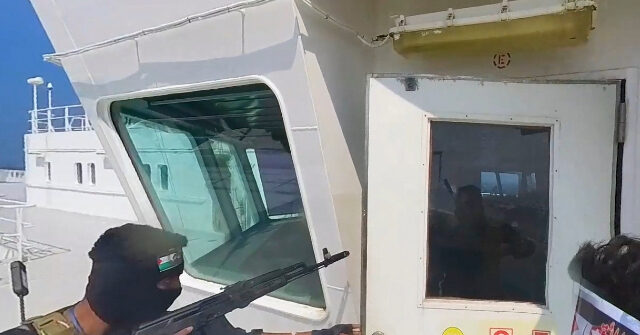Top News
U.S. Yemen Envoy: We Can’t Deter Houthis Militarily, We Also Need ‘Outreach’ to Them

On Wednesday’s “PBS NewsHour,” U.S. Special Envoy to Yemen Timothy Lenderking stated that deterring Houthi attacks on shipping “won’t be a military action alone. I think diplomatic activity will continue, very strong messaging and outreach to the Houthis, see what combination of pressures, incentives will get us back to an ability where the international community can focus on the peace effort in Yemen” that will help moderate the Houthis and help them get international legitimacy and that “we have to get away from the attacks on shipping and dial that back and get back to a focus on the peace effort in Yemen.”
“NewsHour” Foreign Affairs and Defense Correspondent Nick Schifrin asked, “Over the last week…the U.S. and U.K. have launched three rounds of airstrikes on Houthi drones, missiles, air defense capabilities, the very things that the Houthis have used to attack ships in the Red Sea and in the Gulf. But, as we also just said, the Houthis launched two strikes, at least, just today, including on a U.S. ship. So, what evidence do you have that these strikes have degraded Houthi capabilities?”
Lenderking answered, “Well, the strikes that the U.S. and the U.K., in conjunction with other partners, have launched have certainly hit their targets. I think that it’s the hope of all of us that we’re not getting into an open-ended conflict here. That is definitely not the intention of the United States. The United States wants to hit those capabilities that are responsible for the attacks on international shipping. And I think we’ve been quite disciplined so far about keeping within those very well-defined parameters.”
Schifrin followed up “But where does this end? How many rounds of airstrikes do you think you need in order to degrade [the] Houthis to the point where they cannot continue to do what they’ve been doing on commercial shipping?”
Lenderking responded, “This won’t be a military action alone. I think diplomatic activity will continue, very strong messaging and outreach to the Houthis, see what combination of pressures, incentives will get us back to an ability where the international community can focus on the peace effort in Yemen and move away from this conflict and the attacks on shipping.”
Schifrin then asked if the strikes could hurt the peace efforts, Lenderking responded that “we remain 100% committed to that peace effort. I think we all want to get back to that focus, that, whatever else is happening in the region, that Yemen can see an end to the conflict that has dogged it for eight years. And it’s ironic, but the Yemen internal peace process that I described is at its best point in the eight years of this conflict. We can actually begin to see an end to the war. There’s a road map to do that that the parties have agreed on. So, we have to get away from the attacks on shipping and dial that back and get back to a focus on the peace effort in Yemen.”
Schifrin then asked, “And does that peace effort empower the Houthis, who, at least publicly, have not shown the willingness to bring the peace that you would like to in Yemen?”
Lenderking answered, “I think that the peace effort will have a moderating effect on the Houthis. In other words, no party in this road map, as I describe it, gets everything that they want. And the Houthis are going to have to show compromise. There are things that they want in this road map. They have incentive. They’re looking for international legitimacy. And I think the road map is one way that they would derive that. And I think the international committee has been very strongly committed to this road map and wants to see it through.”
Follow Ian Hanchett on Twitter @IanHanchett
Read the full article here


















